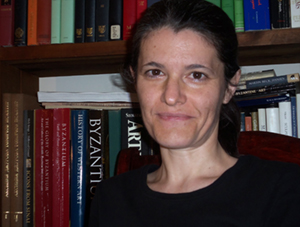Vessela Valiavitcharska

Associate Professor of English and Comparative Literature, English
Affiliate Faculty, Classics
Member, Maryland Language Science Center
vvaliav@umd.edu
3237 Tawes Hall
Get Directions
Research Expertise
Comparative Literature
Early Modern Studies
Language, Writing and Rhetoric
Medieval
Vessela Valiavitcharska studies and writes about rhetorical education in Byzantium and the Slavic world in the context of the trivium: grammar, rhetoric, and logic. Byzantine rhetoric represents “the road not travelled” by its classical Greek and Roman predecessors, a road which took a different turn in western Europe. Its sophisticated, spectacularly powerful creations attest to the effectiveness of rhetorical training, whose goal was to accustom speakers and writers to supple and multiform expression, ready to address any issue in fluent, eloquent, and learned speech.
Her book Rhetoric and Rhythm in Byzantium: The Sound of Persuasion (Cambridge University Press, 2014) looks at a phenomenon known as “rhythm in prose” in Byzantine and Old Church Slavic literature. It makes a case for the importance of rhythm to argumentation in particular and to speech and writing more generally, while suggesting also that rhythm carries across linguistic boundaries. The book contrasts the modern separation between prose and poetry with the more integrated approach of the medieval literature of the Mediterranean and Slavic worlds. It highlights the role of rhythm as a tool for invention and a means of creating a shared emotional experience.
Together with Professor Jeffrey Walker (Emeritus, University of Texas at Austin), she is currently completing a translation and commentary of a treatise on rhetoric by the fourteenth- century Constantinopolitan teacher-scholar-monastic Joseph Rhakendytes. His Synopsis of Rhetoric appears as part of an “encyclopaedia of all knowledge” designed to walk the reader through the key subjects studied in higher education in the Mediterranean east during the flowering of the Palaiologan era. It came to be held in high esteem as a repository of “Greek learning,” and became, for a while, an active participant in the re-discovery and re-assessment of ancient knowledge during the Italian and French Renaissance. Rhakendytes describes rhetoric as “the initial step” in the ladder of learning. Its “noble discourse” strives toward “utmost beauty,” while the rigor of its arguments lays “the foundation of all education” (to borrow from the author). Instruction in the discursive arts was seen as an indispensable prerequisite to higher learning in Byzantium.
With Professor Debra Hawhee, she has co-edited the volume The Practice of Rhetoric: Essays in Honor of Jeffrey Walker (University of Alabama Press, forthcoming in 2022), which features contributions in the history of rhetorical tradition as well as its creative appropriations. Rhetoric, broadly conceived as the art of making things matter, is usefully understood both as a practice and through its practice. The book extends the emphasis on the educational mission of rhetoric found in Jeffrey Walker’s work, presenting rhetorical practice through the prisms of poetics, performance, and philosophy of argument.
Professor Valiavitcharska is concurrently working on a monograph that aims to articulate the ninth- to tenth-century Byzantine “philosophy” of rhetoric and language, which recognizes the close relationship between material medium and content, style and argument, and sound and image.
She has published articles on classical and Byzantine rhetoric, the ekphrastic tradition, scholia and rhetorical commentaries, medieval punctuation practices and performance, figurative language and emotion, and argument visualization. She teaches courses in the history of rhetoric and in medieval literature.

